Grady Leneghan, 17, remembers certain details about the day he served as a pallbearer at a funeral in Cleveland last September.
One thing that stands out: It was a Greek Orthodox ceremony, meaning the Mass progressed differently than Leneghan, a Roman Catholic, was used to.
But for Leneghan, perhaps the most striking thing about this funeral was that he did not know the person who had passed away. In fact, there were no loved ones of the deceased there at all.
“No family really could attend because this person did not have any family,” Leneghan tells TODAY.com.
Leneghan, a senior at Saint Ignatius High School in Cleveland, served as a pallbearer at this funeral as part of his school’s St. Joseph of Arimathea Pallbearer Ministry.
The program, which has been running for more than two decades, invites juniors and seniors to volunteer to carry “men and women who have little or no family to their final place of rest,” according to the school’s website.
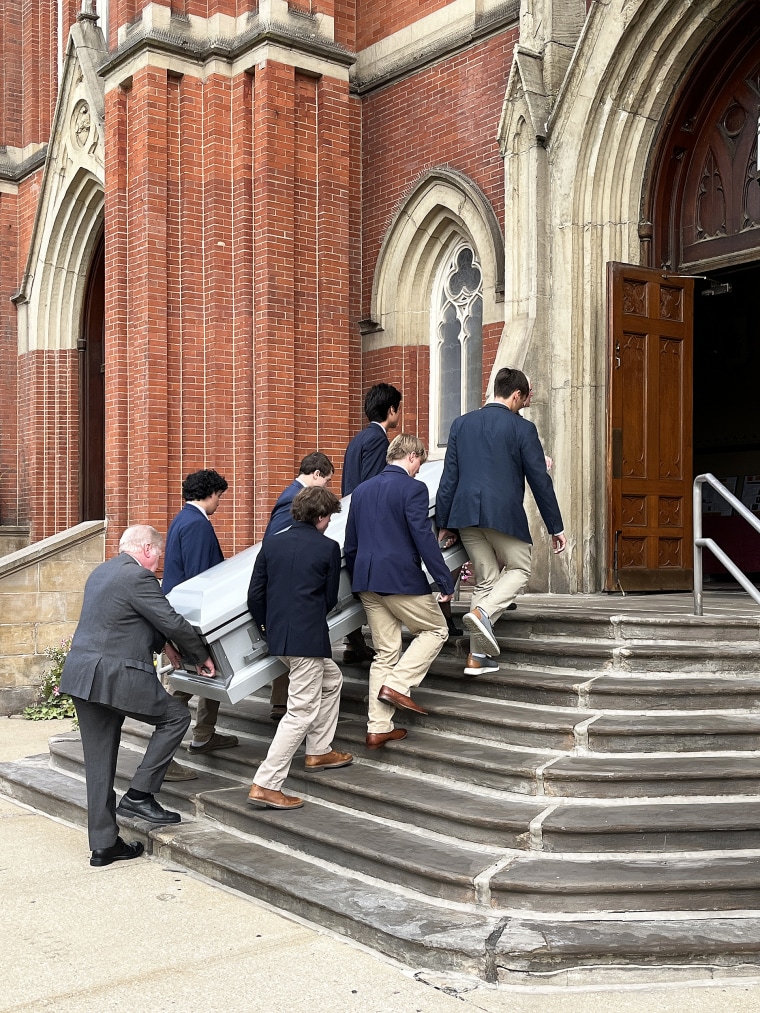
Leneghan says that while serving at funerals for people who have little or no family is “pretty heartbreaking and sad,” it also helps him appreciate the role family plays in his own life.
“It makes you appreciate more of what you are, and who you are as a person,” he said.
Saint Ignatius High School launched its pallbearer program in 2003, starting with 12 students who served three funerals in the first year. Now, about 400 students at the school participate, serving between 150 to 180 funerals annually.
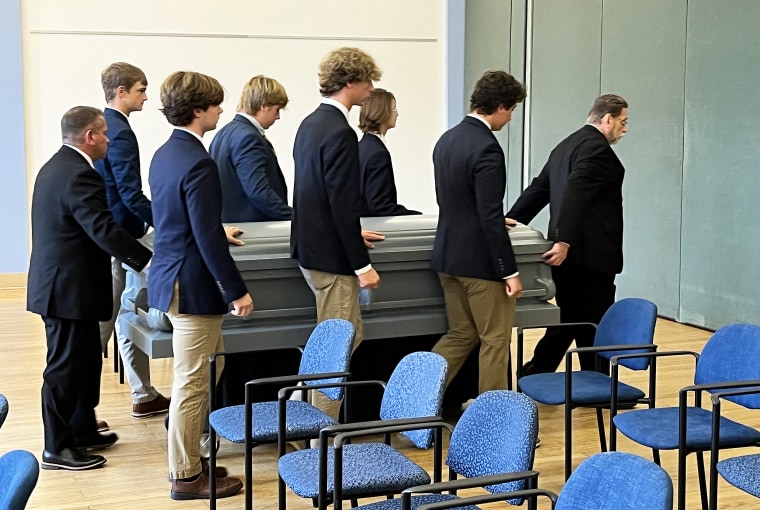
There are other schools around the country that now run their own pallbearer ministries, including Catholic Memorial, a college preparatory school in West Roxbury, Massachusetts; University of Detroit Jesuit high school and academy in Detroit; and McQuaid Jesuit, a private preparatory school in Rochester, New York.
Blaise Weidmann, 16, a junior at McQuaid Jesuit, says he and his fellow student pallbearers underwent special training to serve.
“We had to learn how the casket comes out of the hearse, how we carry it,” he tells TODAY.com. “We practiced a few times carrying and just getting the steps and how fast or slow we have to walk with it.”
Their role at a funeral isn’t simply to carry the casket, but also to offer spiritual support, sometimes joining in prayer and singing hymns “to honor the soul of the person who passed away,” Weidmann says.
Student pallbearers typically volunteer at a range of services, including funerals for poor or elderly people with no surviving family members, as well as for nuns and people outside the Roman Catholic faith.
“It’s really extraordinary to take note of someone who was left to die in the cold on the street,” Richard Mazyck, campus ministry and service coordinator for University of Detroit Jesuit school, told TODAY.com in 2023. “They have no family and friends that anyone is able to contact. … It’s a reminder that every person, especially in the Christian religious tradition, is made in the image of God and is deserving of a particular regard and respect.”
Saint Ignatius students also participate in an annual service at Potter’s Field, a burial ground for the homeless in the Cleveland area.
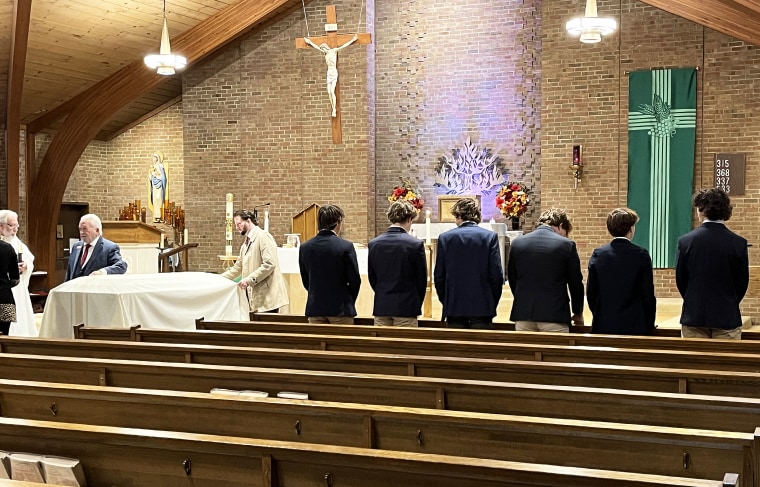
“We’ve served at funerals where literally the only people in attendance are the six pallbearers, the adult that drives them, the funeral director and the priest,” Pat Valletta, who coordinates Saint Ignatius’ pallbearer program, tells TODAY.com. “And we’ve been at other funeral homes or funerals where there’s been 100 people there.”
Even when family members of the deceased person are present, student pallbearers can serve as a valuable source of comfort.
Evan Solar, 18, a senior at Saint Ignatius, remembers one touching moment he shared with a woman during a funeral on the west side of Cleveland in April.
“We always hand out a card, a sympathy card to the family,” he said. “The woman who I handed it to … wasn’t being super emotional throughout, but when we handed her the card, she broke down in tears and was just so appreciative and thankful.”
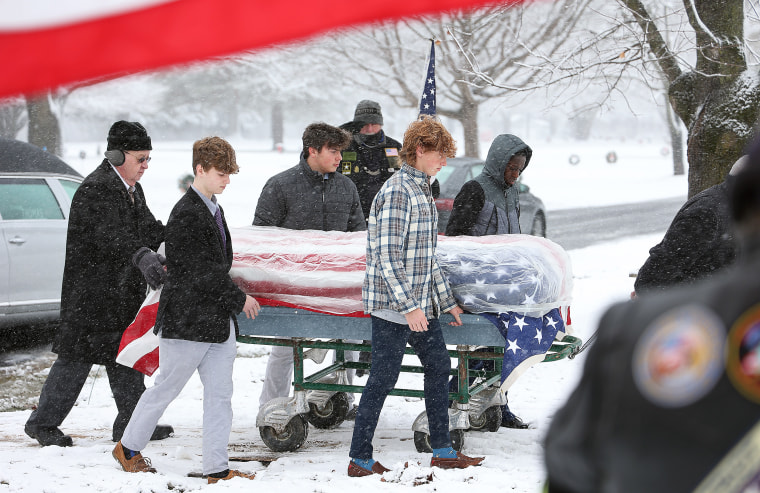
Schools with pallbearer programs have served veterans as part of their services. In 2017, Catholic Memorial college preparatory school began hosting funeral processions for veterans who died without friends or loved ones.
Services often take place in the school’s chapel, or in the school’s gym in front of the entire student body.
“Kids begin to recognize that those are people who have sacrificed much and have displayed incredible courage, duty and honor,” Peter Folan, president of Catholic Memorial, told TODAY.com in 2023.
“And now in their final moments, for a whole host of reasons, some of which we don’t know enough about each individual, they are alone — and we’re here to stand with them and bring them into our community,” he continued. “That has a transformational impact on a 15- or 16-year-old young man.”
Catholic Memorial recently shared an Instagram photo of its student pallbearers serving at the funeral of Pfc. John Joseph Winters, a U.S. Army veteran.
“Winters died with no remaining friends or family to celebrate his life. On Monday morning, we were his family,” the school captioned the Nov. 4 post.
The school said a funeral Mass was held in the school chapel and that “following Mass, an honor guard gave Mr. Winters full military honors by playing Taps and folding and presenting our nation’s flag.”
For Catholic schools with a pallbearer ministry, serving at funerals is a way for students to carry out a charitable act known within Catholicism as a “corporal work of mercy.”
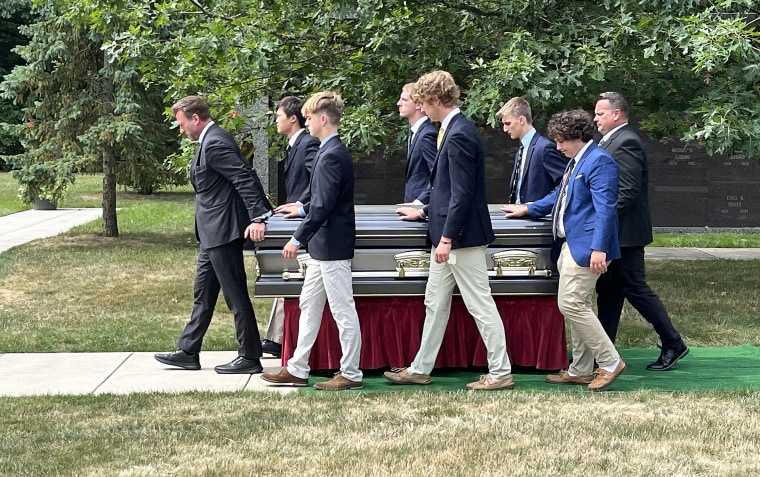
“We really see it … as something that’s honorable and meaningful, but it’s also directly linked to Catholic social teaching, and it is a really concrete way to put that work of mercy into practice,” Adam Baber, director of service and justice at McQuaid Jesuit, tells TODAY.com.
For Solar, the Saint Ignatius senior, serving as a pallbearer feels meaningful.
“We’re all called to serve, and that doesn’t always look like … building a well,” he says.